Updated
The Game of Charades concerning the Western Sahara – Ambassador Edward M. Gabriel (ret.)

King Mohammed VI meets with UN Personal Envoy for the Western Sahara Horst Köhler Photo: MAP Express
Ambassador Edward M. Gabriel (ret.)
April 19, 2019
 If it’s April, it must be another round of charades at the UN Security Council regarding the Western Sahara. And if this year is anything like the past, the latest UN resolution can be written by most Sahara watchers before it is even published. It will most likely call the Moroccan proposal realistic, credible, and serious, and will “take note” of the Polisario proposal, which is not a proposal at all but a reiteration of the dead-on-arrival, winner-take-all referendum, abandoned more than two decades ago. The resolution will call on both parties to negotiate in good faith, for the human rights of all citizens on both sides to be honored, and for enhanced “confidence building measures” between the parties. Meanwhile the UN’s peacekeeping mission that oversees the Sahara conflict – MINURSO – has spent hundreds of millions of dollars since its inception.
If it’s April, it must be another round of charades at the UN Security Council regarding the Western Sahara. And if this year is anything like the past, the latest UN resolution can be written by most Sahara watchers before it is even published. It will most likely call the Moroccan proposal realistic, credible, and serious, and will “take note” of the Polisario proposal, which is not a proposal at all but a reiteration of the dead-on-arrival, winner-take-all referendum, abandoned more than two decades ago. The resolution will call on both parties to negotiate in good faith, for the human rights of all citizens on both sides to be honored, and for enhanced “confidence building measures” between the parties. Meanwhile the UN’s peacekeeping mission that oversees the Sahara conflict – MINURSO – has spent hundreds of millions of dollars since its inception.
There is however an outside chance that this April could be different. Given the fact that US National Security Adviser John Bolton seems to have had enough of the US wasting money on UN missions like this one that show little or no progress, now may be the time for the State Department to inject new momentum. To avoid the wrath of the chopping block by the White House NSC, this could instead become an example of what happens when the US makes up its mind to get its money’s worth at the UN.
Thanks to a declassified report of the State Department, we now know the past promises made by the United States to Morocco in exchange for its willingness to promote an internationally recognized form of autonomy for the people living in the Sahara under Moroccan sovereignty. Most importantly, we know that the United States guaranteed protection of Moroccan sovereignty in any future proposals proffered by the UN. With that genie out of the bottle, the world now has access to the US secret agreement with Morocco concerning the Western Sahara. This is the time for Moroccan diplomacy to demand the US live up to those promises made to King Mohammed VI twenty years ago.
As the newly released declassified document suggests, the US and Morocco came to a meeting of the minds in 1999, with the former promising King Mohammed VI that if he would agree to a compromise sovereignty/autonomy solution, it would protect its sovereignty and exert its influence to avoid any hostility between Morocco, Algeria and the Polisario. The King accepted the deal.
The next move was for the US to bring France and other UN Security Council partners on board with this proposal. Ron Neumann, then Deputy Assistant Secretary of State, made his first visit to France just before President Clinton stepped down and President Bush took over, and had promising meetings there. The effort unfortunately slowed down when the new US President took office and UN Personal Envoy James Baker found resistance in Algeria. Had Morocco not hesitated for a year longer than expected to respond to what would become the UN offer, during the last year of the Clinton administration in 2000, more progress may have been made which may have concretized the deal at the UN before the President left office.
My colleague Robert Holley has recently offered a number of proposals in two articles, one published on April 12, and another on March 25, which serve as a roadmap of ideas that the US could undertake to encourage Algeria and the Polisario to begin serious negotiations on a win-win solution within the Moroccan sovereignty-autonomy framework as a way of energizing this moribund process.
For instance, during the past decade, the Moroccan American Center was successful in proposing funding from Morocco’s aid package to be allowed to support governance programs in its Saharan provinces. If the State Department would show unqualified support for this congressional action, it would send a serious signal that the US is leaning towards the Moroccan initiative as the only viable solution between the parties. Further, the US could send its Head of Mission to Morocco to visit the Sahara and announce new projects there as a prod to the Polisario and Algeria that the status quo is no longer acceptable to the US.
These two actions taken together would send a signal that the US is now serious about moving the Sahara question forward, and suggest that the Polisario and Algeria should take the negotiations seriously or lose out in shaping the future of the Sahara region.
We will know in the next few weeks whether the US sees a new opportunity to inject this UN peacekeeping mission with new life to shake up the parties and give them hope to bring this far too long mission to a conclusion, and thus put one UN effort in the category of US successes, one that proved to be cost effective and durable.